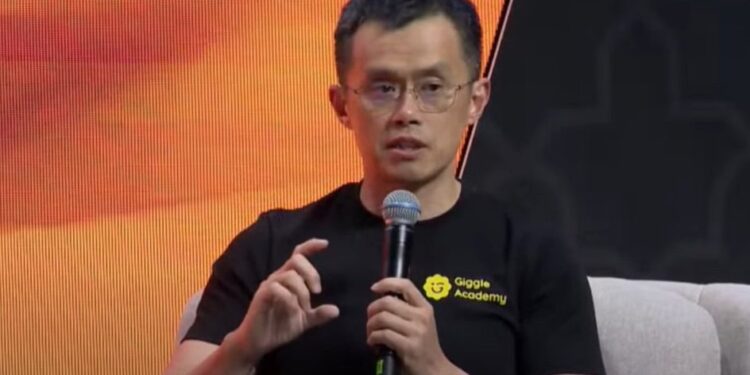The former head of Binance broke the news: China may secretly lay out its national Bitcoin reserve!
 summary:
The former head of Binance broke the news: China may secretly lay out its national Bitcoin...
summary:
The former head of Binance broke the news: China may secretly lay out its national Bitcoin... The former head of Binance broke the news: China may secretly lay out its national Bitcoin reserve!
Zhao Changpeng on Bitcoin as a Strategic Reserve: Could China Join the Wave?
At the Bitcoin MENA conference held in Abu Dhabi on December 9, 2023, former Binance CEO Zhao Changpeng (CZ) shared insightful perspectives on Bitcoin's global strategic role. He suggested that China might become one of the nations to adopt Bitcoin as a strategic reserve, though the process could be slow, with smaller nations likely taking the lead. This viewpoint has garnered significant attention within the industry, as it touches on potential transformations in the global financial system.
Background of Bitcoin as a Strategic Reserve
Since its inception in 2009, Bitcoin has evolved from a niche digital asset to a financial instrument with global influence. Many nations are beginning to recognize the potential of cryptocurrencies as a critical component of future asset allocations. Against a backdrop of increasing global economic uncertainty, persistent U.S. interest rate hikes, and volatile monetary policies, Bitcoin's fixed supply and decentralized nature position it as a potential tool to hedge against inflation and economic instability.
Smaller Nations Taking the Lead
Zhao highlighted that smaller nations might be the first to adopt Bitcoin as a strategic reserve asset. For instance, economically smaller yet financially open nations like El Salvador have already embraced Bitcoin as legal tender. These countries aim to attract global investors' attention through Bitcoin adoption, seeking unique competitive advantages in international financial markets.
Additionally, nations with limited foreign exchange reserves may view Bitcoin as a hedge against local currency devaluation. While such a strategy carries risks, it could offer these countries an alternative means to strengthen financial resilience in a globalized economy.
China’s Potential and Challenges
When discussing whether China might adopt Bitcoin as a strategic reserve, Zhao maintained a cautiously optimistic stance. He noted that China's government, known for its opacity, has an unpredictable stance on cryptocurrencies. While cryptocurrency trading and mining are strictly regulated in China, the government is actively advancing the rollout and application of the digital yuan.
Zhao suggested that, although there is no clear evidence of the Chinese government stockpiling Bitcoin, it might feel compelled to follow suit if other major economies, such as the U.S., adopt Bitcoin as a strategic reserve. However, China might choose a “stockpile first, announce later” approach to avoid significant market volatility domestically and internationally.
The Role of the U.S. and Global Ripple Effects
Zhao emphasized that if the U.S., under its upcoming administration, initiates a Bitcoin reserve strategy, it could profoundly impact the global economy. As a central player in global finance, U.S. actions often set a precedent for other nations. Should the U.S. begin treating Bitcoin as a strategic asset, other nations might have to consider similar policies to remain competitive.
Indeed, the 2024 U.S. presidential election presents a critical juncture for Bitcoin and cryptocurrency policies. A future administration openly supportive of cryptocurrency development could not only attract more investors to the market but also reshape the global financial landscape.
Bitcoin as a “Hard Asset”
Zhao has repeatedly emphasized that Bitcoin is currently the only true "hard asset." This assertion stems from Bitcoin's scarcity, with its total supply capped at 21 million, making it immune to arbitrary inflation. This gives Bitcoin a value-storage property similar to gold. However, unlike gold, Bitcoin is easier to store, transfer, and is free from physical limitations.
In an environment of increasing global inflationary pressures, Bitcoin could gradually emerge as a competing safe-haven asset alongside gold. Both individual investors and national institutions may drive demand for Bitcoin, further elevating its market value.
Future Prospects for Bitcoin as a Strategic Reserve
Although the concept of Bitcoin as a strategic reserve is still in its infancy, its potential impact cannot be underestimated. As more nations explore the possibilities of digital assets, Bitcoin could increasingly integrate into mainstream financial systems. While this process may take years, its long-term implications could redefine our understanding of capital markets and monetary systems.
From an international competition standpoint, countries that proactively position themselves in the Bitcoin and digital asset space may gain a significant advantage in the future. In an era where technology and finance are deeply intertwined, a nation's ability to leverage emerging assets will directly influence its global standing.
Tags: Bitcoin, Strategic Reserve, China, Zhao Changpeng, Cryptocurrency

